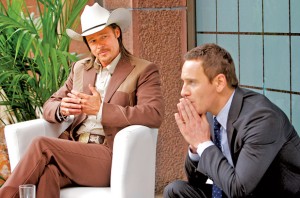RICHARD’S “CANADA AM” REVIEWS FOR OCT. 25, 2013 W/ BEVERLY THOMSON
 Movie critic Richard Crouse sounds off on this week’s movie releases: ‘All is Lost,’ ‘Escape from Tomorrow,’ and ‘The Counselor.’
Movie critic Richard Crouse sounds off on this week’s movie releases: ‘All is Lost,’ ‘Escape from Tomorrow,’ and ‘The Counselor.’
Watch the whole thing HERE!
 Movie critic Richard Crouse sounds off on this week’s movie releases: ‘All is Lost,’ ‘Escape from Tomorrow,’ and ‘The Counselor.’
Movie critic Richard Crouse sounds off on this week’s movie releases: ‘All is Lost,’ ‘Escape from Tomorrow,’ and ‘The Counselor.’
Watch the whole thing HERE!
 “The Counselor” is the feel bad movie of the year.
“The Counselor” is the feel bad movie of the year.
Bleak and hopeless, it’s an ice-cold crime drama that examines the reasons and consequences of crime instead of focusing on the crime itself. It’s a stylish cautionary tale about the worst of human behavior driven by greed, lust and hubris; a non-action, action movie where most of the fireworks are in McCarthy’s dialogue. Luckily actors like Javier Bardem, Brad Pitt, Rosie Perez and Michael Fassbender are there to keep the fuse lit.
In Cormac ‘No Country for Old Men’ McCarthy’s screenwriting debut he tells a gritty story about a greedy lawyer (Fassbender) in over his head after dipping his toe into the narcotics trade with charismatic drug lord Reiner (Bardem) and his sociopath girlfriend Malkina (Cameron Diaz).
When the deal, smuggling carrying 625 kilos of cocaine from Mexico to Chicago, goes south after one “we’ve got a problem” phone call, the Counselor finds his life swirling out of control.
Spiraling around this grim vortex are womanizing middle-man Westray (Pitt), prison inmate Ruth (Rosie Perez) and the counselor’s long-distance girlfriend Laura (Penélope Cruz).
In “The Counselor” director Ridley Scott mutes his usual high-octane visual sense to focus on the words.
And there’s a lot of them.
Talky to the extreme, the entire movie is built around dialogue that sounds like it flowed from the hardest boiled crime writer out there, which I guess McCarthy is now that Elmore Leonard is working from his celestial typewriter. Catch phrases abound—“You don’t know someone until you know what they want,” for example—but it is wordy. Sometimes brilliantly so, but the pacing, particularly in the first hour, will be thought of as hypnotic by some, slow by others.
Scott takes his time creating tension in every scene, which really begins to pay off in the second hour when the themes of truth or consequences really start to pay off. “If you think you can live in this world and not be part of it, you’re wrong,” the Counselor is told, just after it’s too late to change his fate.
Or the most part the acting is top notch. Fassbender’s shift from confident criminal to a man who lands himself in a world of trouble after doing a good deed gives a nakedly raw performance. As his desperation grows his defenses drop and the weight of what he did in the name of greed crushes him.
Perez and Pitt (who’s in his “Killing Them Softly” mode here) are both fine, and it’s hard to imagine anyone else describing a “gynecological” love scene between a woman and a car with as much strange gusto as Bardem. “You see something like that,” he says, “and it changes you.”
These actors bring the words to life. Unfortunately the same can’t be said for Diaz, whose cold-blooded take on the character is too detached to be truly effective.
Like “Killing Them Softly,” another thriller that relied on dialogue and ideas to provide the thrills instead of gunshots and explosions, “The Counselor” will polarize people. Some will find it a head scratcher, others will be drawn into its uncompromising look at life and death, cartel style.
Still others, like me, will be left half in, half out, wishing the film’s virtues—it’s dialogue and ideas—were propped up with just a bit more attention to plot and possibly some warmth. But the chilliness of the story and characters may be McCarthy’s point. Early on Malkina says, “I don’t think truth has a temperature,” which sums McCarthy’s ice cold look at primal, criminal behavior.
 Cormac McCarthy may not be a household name around your place, unless you live with the Coen Brothers or maybe with the Pitt’s.
Cormac McCarthy may not be a household name around your place, unless you live with the Coen Brothers or maybe with the Pitt’s.
Literary critic Harold Bloom called the writer one of the four major American novelists of his time, and he has two all-star movies set for release, which may make his name a little more commonplace.
Later in 2013 James Franco directs, scripts and stars in Child of God, an adaptation of Cormac’s 1973 novel about, “a dispossessed, violent man whose life is a disastrous attempt to exist outside the social order.”
This weekend a star-studded cast lead by Brad Pitt, Cameron Diaz and Michael Fassbender headline The Counselor, directed by Ridley Scott.
Producer Steve Schwartz says the story of a lawyer in over his head after dipping his toe into the drug trade, “may be one of McCarthy’s most disturbing and powerful works.”
And that’s saying something about the writer who gave us a character like No Country for Old Men’s killing machine Anton Chigurh. Empire.com warned that when, “McCarthy throws “a dark character at you, it’s a safe assumption that you’re not going to be able to get them out of your head for a good, long while—if ever.”
As written by McCarthy and played by Javier Bardem, who earned an Academy Award for Best Supporting Actor for the part, Chigurh is merciless, a murderer who makes life and death decisions with the flip of a coin.
The Road—a 2007 Pulitzer Prize winner for fiction—is another disturbing McCarthy novel adapted for the big screen.
The story is simple. A man and his son (Viggo Mortenson and Kodi Smit-McPhee) try to survive in a dystopian world. Armed with only a gun and two bullets they must scavenge for food amid the ruins and protect themselves from cannibals who roam the desolate land.
The Road is a movie based on small moments set against a big backdrop. No parent will be able to forget the stark image of seeing a young boy who doesn’t know what a can of Coke is or a father teaching his son how to commit suicide.
It’s tough, no nonsense work from a writer who says he’s “not that big a fan of exotic foreign films,” especially movie with magical realism. “You know, it’s hard enough to get people to believe what you’re telling them without making it impossible,” he says. “It has to be vaguely plausible.”